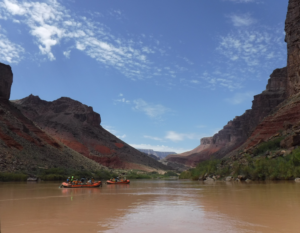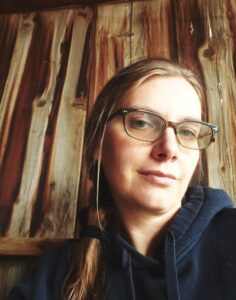 I never think of the ocean. Even after having lived near one for a year, I’m such a desert dweller at heart that the idea of an ocean never really crosses my mind. Instead, I think of rivers. I think of western flowing water that hides at the bottoms of canyons as they cut across the arid landscapes.
I never think of the ocean. Even after having lived near one for a year, I’m such a desert dweller at heart that the idea of an ocean never really crosses my mind. Instead, I think of rivers. I think of western flowing water that hides at the bottoms of canyons as they cut across the arid landscapes.
Water is such a powerful and persistent force. It can wear down just about any solid matter given enough time. When I think of struggle or of hardship, my go-to metaphor is water—not the repeatedly crashing waves of ocean upon beach, but the continuous force of a river current, pushing ever forward.
My last “normal” job was for a river rafting company. I only went on a few trips during my time there, but they were enough to implant the power of rivers—and the mighty Colorado River in particular—firmly in my mind.
At times, the water, passing between the walls of Grand Canyon, is deceptively smooth and calm. Other times, it can be rough and choppy. Still other times, it stirs wildly into rapids of giant waves, holes, and eddies. It is at once fundamentally the same—the way the water flows over and around the rock formations and canyon obstacles—and fundamentally different—in that as this water flows past, it is replaced by new water endlessly for as long as its source can supply it.
This year, my mother-in-law died. For two years prior, she had been fighting cancer, and all the while, our family continued to be beset by other, lesser tragedies and challenges. Now we face those challenges through grief as our lives, like the river, flow ever onward.
My father-in-law has also rafted through Grand Canyon. It is an experience we’ve been able to bond over, discussing the places in the canyon and the unique experiences that only one who has traveled this river can truly relate to.
Three months after he lost his wife and my husband his mother, we had a conversation about grief. My father-in-law said we were not in the same boat, but we could look out and see each other in different boats floating nearby. I likened it to traveling the river in a fleet of rafts. We are on the same water, but each of us makes our own choices and takes our own lines through the rapids that change our individual experiences. We travel together for safety and support. If one of us should get in trouble, the others are there to lend aid, even as they, too, are pushed along by the same current.
During that same conversation, my husband revealed that several people have advised him that he just has to “get through it,” as though grief is something you can rush your way through in order to get out of it. I’m reminded of a piece of wisdom an old coworker (before the rafting company) shared with me: “You do not have to push the river. It moves on its own.” I don’t know who she was quoting, but the phrase stayed with me. I think of it when this sort of suggestion to rush one’s grieving comes up.
The river of grief moves on its own, and each of us in our own boats moves with it. We make choices, select paths, row to stay with the current and not get stuck to the side spinning about in an eddy, but the river moves regardless. It flows, it transforms, it replenishes itself, and we are along for the ride, helping each other as best we can. If one of us makes a bad choice and our boat flips, the others are there to pull us out of the current, turn our boat back over, make repairs if needed, and help us continue down the river.
I like this model of support. I think it extends beyond our family experiencing its particular current of grief and other life obstacles. At the rafting company, we often talked of the “river community.” The bottom of Grand Canyon is a remote and inaccessible backcountry environment, and it can be dangerous—sometimes deadly. Because of that, everyone traveling the river takes responsibility for providing aid to everyone else. They don’t need to be told to do this. They just do. Boat drivers linger at the bottoms of dangerous rapids to ensure those who follow behind them are safe. Resources are shared when there is an abundance. Camps are chosen with courtesy and consideration toward the needs of other travelers.
To me, this is how the world ought to be. We may not agree with each other. We may not even like each other. Each of us on our own boat experiences the river differently, but each of us knows and has reverence for the relentless power of water. No one wants anyone to succumb to its force and drown. So, we look out for each other, knowing that whatever help may lie beyond these canyon walls is not guaranteed. We are there for each other because we recognize our common journey. We teach each other because we too were once inexperienced. In the river community, we all want to see everyone make it through. Shouldn’t we also strive for that in life?
Whether we are kind and helpful or greedy and spiteful, the river propels us forward all the same. We can face these challenges alone or together. Alone can be easier in some ways–not being accountable to anyone, not having to think of others or make space for them is less of a certain kind of work. But there is a danger in taking on life’s challenges solo. If you can’t see anyone else’s struggle, you start to think you are the only one facing hardship. You start to wonder why you’re still bothering to travel the river. Better, I think for us all to look out all at the other boats and recognize that we matter to each other.

